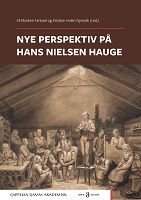Nye perspektiv på Hans Nielsen Hauge
| dc.contributor.author | Farstad, Eli Morken | |
| dc.contributor.author | Nymark, Kristian Holen | |
| dc.contributor.author | Bugge Amundsen, Arne | |
| dc.contributor.author | Garcia de Presno, Jostein | |
| dc.contributor.author | Gilje, Nils | |
| dc.contributor.author | Langhelle, Svein Ivar | |
| dc.contributor.author | Norseth, Kristin | |
| dc.contributor.author | Roos, Merethe | |
| dc.contributor.author | Kringlebotn Sødal, Helje | |
| dc.contributor.editor | Farstad, Eli M. | |
| dc.contributor.editor | Nymark, Kristian H. | |
| dc.date.accessioned | 2023-10-20T10:19:43Z | |
| dc.date.available | 2023-10-20T10:19:43Z | |
| dc.date.issued | 2023 | |
| dc.identifier | OCN: 1406069688 | |
| dc.identifier.uri | https://library.oapen.org/handle/20.500.12657/76892 | |
| dc.description.abstract | Hans Nielsen Hauge established and led at the end of the 18th century Norway's first nationwide popular movement, a low church network that would leave its mark on everyday life, business development and politics in the transition from absolute monarchy to representational government. People called themselves Haugians long after Hauge's death in 1824. It was a spiritual awakening on a scale that deserves considerable room when we write the history of modern Norway. This book provides a new perspective on the roots of the Hauge movement in the religious mentality of the 18th century, on how it functioned in its most radical phase up to 1814, and on the importance of the network for economic modernization and political mobilization in the subsequent decades. Retrospective interpretations of Hauge's complex endeavor are also explored. In sum, the nine chapters provide a broader understanding of the Hauge movement and the era in which it flourished. We hope that the book also sheds light on the state of Norway's people, government and religiosity today, over 250 years after Hauge's birth. The book has been edited by research fellow Eli Morken Farstad and associate professor Kristian Holen Nymark, both historians at the University of South-Eastern Norway. | en_US |
| dc.language | Norwegian | en_US |
| dc.subject.other | Hans Nielsen Hauge, Haugean movement, religiosity, social movement, political mobilization, Hans Nielsen Hauge, Hauge-bevegelsen, religiøsitet, folkebevegelse, politisk mobilisering | en_US |
| dc.title | Nye perspektiv på Hans Nielsen Hauge | en_US |
| dc.type | book | |
| oapen.abstract.otherlanguage | Hans Nielsen Hauge startet Norges første landsomfattende folkebevegelse på slutten av 1700-tallet. Det lavkirkelige nettverket satte sitt preg på hverdagsliv, næringsutvikling og politikk i overgangen fra enevelde til folkestyre. Folk kalte seg haugianere lenge etter Hauges død i 1824. En slik vekkelse må få stor plass når vi skriver historien om det moderne Norge. Denne boka gir nye perspektiv på Hauge-bevegelsens røtter i 1700-tallets religiøse mentalitet, på hvordan vekkelsen virket i sin mest radikale fase fram mot 1814, og på nettverkets betydning for økonomisk modernisering og politisk mobilisering framover i hundreåret. Ettertidens fortolkning av Hauges mangslungne virksomhet blir også lagt under lupen. I sum gir de ni kapitlene en bredere forståelse av Hauge-bevegelsen og tiden den virket i. Vi håper at boka også kan kaste lys over folk, stat og religiøsitet i dag, over 250 år etter Hauges fødsel. Boka er redigert av stipendiat Eli Morken Farstad og førsteamanuensis Kristian Holen Nymark, begge historikere ved Universitetet i Sørøst-Norge. | en_US |
| oapen.identifier.doi | 10.23865/noasp.190 | en_US |
| oapen.relation.isPublishedBy | bf7b42a4-6892-42e3-aaf8-8f32c8470a8b | en_US |
| oapen.relation.isFundedBy | 1d9d8463-855a-40b7-a1fc-35413cd18359 | en_US |
| oapen.relation.isFundedBy | e986e1bf-97d2-46f6-910c-91340657ef7b | en_US |
| oapen.relation.isFundedBy | 39729116-4b2f-4b53-936b-3f05ae46f005 | en_US |
| oapen.relation.isbn | 9788202809249 | en_US |
| oapen.relation.isbn | 9788202814861 | en_US |
| oapen.relation.isbn | 9788202814878 | en_US |
| oapen.relation.isbn | 9788202814885 | en_US |
| oapen.pages | 205 | en_US |
| oapen.place.publication | Oslo | en_US |
| oapen.remark.public | Funder name: University of South-Eastern Norway, MF Norwegian School of Theology, Religion and Society |

